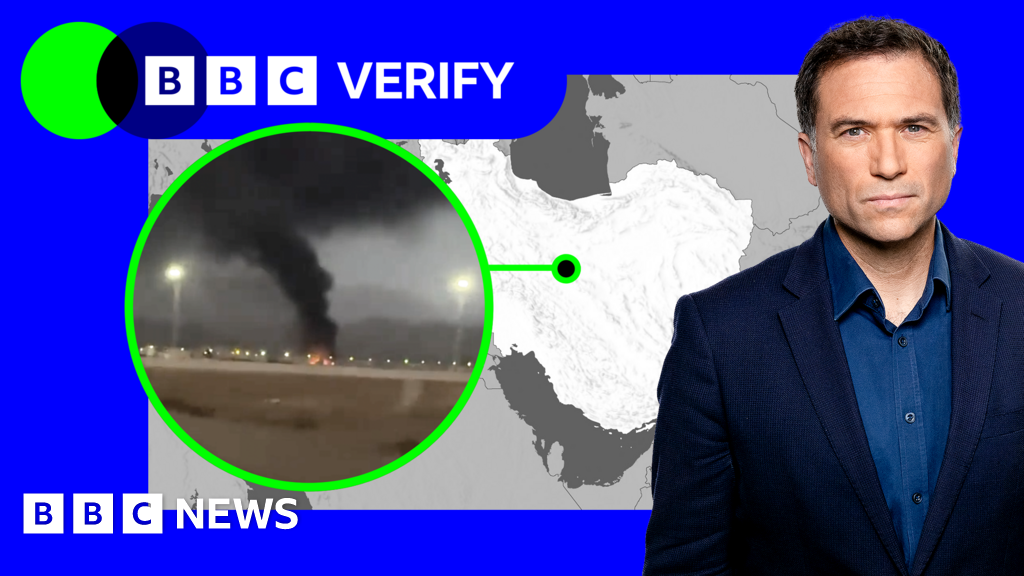Israel's Prime Minister, Benjamin Netanyahu, has long warned that Iran is close to developing nuclear weapons. After Israel launched attacks on Iran last week, Netanyahu said Iran could produce a bomb within months. BBC Verify's Ros Atkins explains what we know about Iran's nuclear programme. Produced by Aisha Sembhi. Additional reporting by Thomas Spencer and Kayleen Devlin. Graphics by Mark Edwards. The BBC heard from dozens of former officials about their role enforcing the brutality of the Assad regime. Mirjana Spoljaric has appealed to world leaders to intervene in the conflict in Gaza. The BBC’s Anna Foster hosts a debate to discuss whether there have been war crimes in Israel and Gaza. The UN's Tom Fletcher tells the BBC the people of Gaza have been subjected to forced starvation by Israel. A Unifil spokesperson said the main violations of a ceasefire deal reached six months ago are from the Israeli side. Ward Jalal Al-Shaikh Khalil escaped the flames at the school, unaware her mother and two siblings had died in the strike. The BBC's Wyre Davies visits the Kerem Shalom crossing, through which aid for Gaza is currently passing after Israel eased an 11-week blockade. Witnesses tell the BBC about hearing gunshots and the shooter shouting: 'Free Palestine'. Israel says its reopened access for a limited number of aid trucks into Gaza, after blocking supplies from entering the territory for the last 11 weeks. BBC Verify has been looking into the latest strikes and aid situation in Gaza. Dr Rose has been describing life at Nassar Hospital in Gazan city of Khan Younis. About 14,000 babies will die in 48 hours if aid does not reach them, a UN humanitarian chief warns. The BBC's Analysis Editor Ros Atkins looks at how world leaders are responding to Israel's blockade of Gaza. Tuesday's strike killed 28 people, the Hamas-run civil defence said. Israel says it was a precise strike on Hamas. In the first major diplomatic trip during his second term, the president is hoping to secure significant new investment in the US in the four-day trip to Saudi Arabia, Qatar and UAE. The BBC's Fergal Keane reports on the rise of malnutrition in Gaza's children. British-Israeli hostage Emily Damari, 28, who was held captive in Gaza, is visiting the UK for the first time since her release. Buildings burn and land is scorched as wildfires spread outside of Jerusalem. At least four people have been killed and 500 more injured in Bandar Abbas. Netanyahu is the first world leader to visit the White House since the US president announced tariffs on global trading partners. The video was published by the Palestine Red Crescent Society (PRCS), which said it was obtained from the phone of a paramedic who was killed.
Ros Atkins on... How close is Iran to a nuclear weapon?
TruthLens AI Suggested Headline:
"Netanyahu Claims Iran Could Develop Nuclear Weapon Within Months Amid Regional Tensions"
TruthLens AI Summary
Israel's Prime Minister, Benjamin Netanyahu, has consistently warned that Iran is nearing the completion of its nuclear weapons program. Following a series of Israeli strikes on Iranian targets last week, Netanyahu asserted that Iran could potentially produce a nuclear bomb within a matter of months. This claim has raised significant concerns among international observers regarding the implications for regional security and the potential for escalating tensions. The BBC's Ros Atkins provides an analysis of the current state of Iran's nuclear ambitions, drawing on insights from various former officials who have monitored the situation closely. The complexities of Iran's nuclear program and the geopolitical ramifications of its advancement are critical points of discussion, especially in light of Israel's military actions aimed at curtailing Iran's capabilities.
In addition to the developments concerning Iran, the situation in Gaza continues to deteriorate amidst ongoing conflict. Reports indicate that humanitarian conditions are dire, with a UN humanitarian chief warning that approximately 14,000 babies could perish within 48 hours if aid does not reach the region. The Israeli government has recently eased an 11-week blockade, allowing a limited number of aid trucks into Gaza. However, the conflict remains intense, with civilian casualties reported from strikes conducted by both Israeli forces and Hamas. The international community is responding to the situation with calls for intervention and discussions around potential war crimes. As these events unfold, the implications for both Iran's nuclear capabilities and the humanitarian crisis in Gaza remain critical issues that demand ongoing attention from global leaders and media outlets alike.
TruthLens AI Analysis
You need to be a member to generate the AI analysis for this article.
Log In to Generate AnalysisNot a member yet? Register for free.
